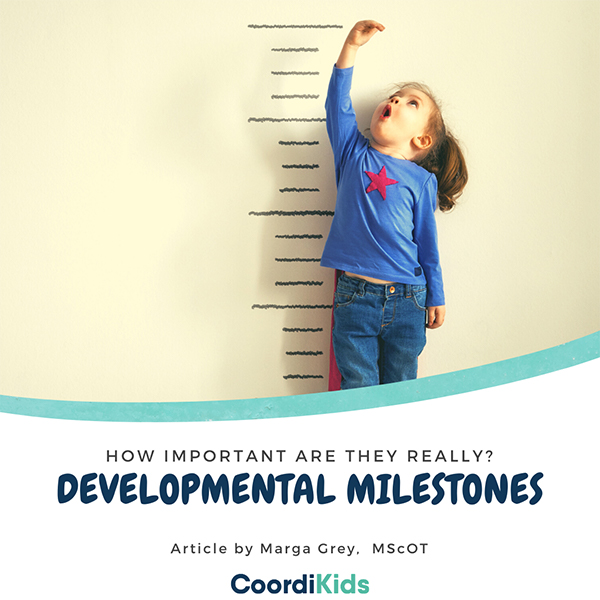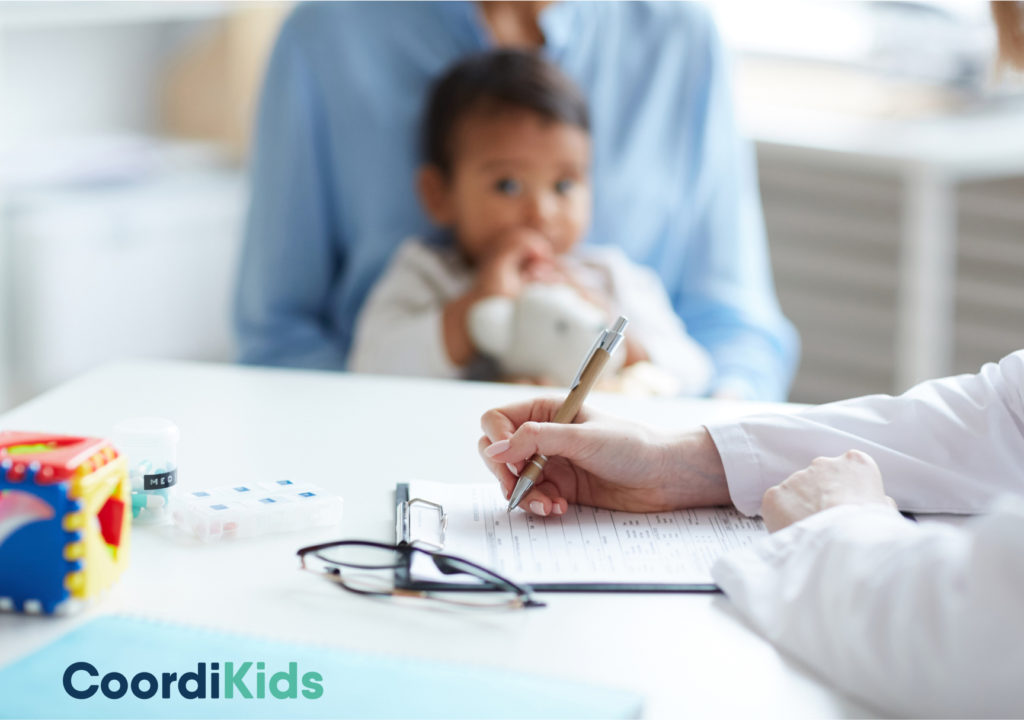Fine Motor Skills, General Information
Developmental Milestones: Why is Fine and Gross Motor Skills Important
Today’s parents have so many more resources at their fingertips than we did a generation ago. I’m amazed at the creativity of some parents that I see on Pinterest. There are so many ways to make gross and fine motor skills development fun. I’m also amazed at the knowledge that most parents are arming themselves with as they enter the new world of parenthood for the first time.
Here’s what I wonder though. Is there a downside to having so much information about what to expect with your child?
It’s a difficult thing to consider the pros and cons. I think about when the now-famous book What to Expect When You’re Expecting was first published. It has changed the world of maternity forever.
Going through your first pregnancy without a guide is quite intimidating and frightening! Having the encyclopedic textbook has certainly helped millions of mums worldwide put their fears to rest about every daily change in their body!
But it also has raised undue fears in certain cases. For example, the book might say that mums can often feel the first kick of their child anywhere from 16-25 weeks of pregnancy. So, for those mums in their 24th week who haven’t felt a kick yet – I’m sure it’s worrisome! No one likes to be the last one to the party.
The reality is, as we know, that every pregnancy is as different as a snowflake. Every body is different. And every child will be different as well. Our stories are each unique.
That’s why I sometimes feel … well … sad when I am met by a parent who is absolutely distraught that her child hasn’t hit a recent fine motor skills development milestone on time. I don’t say that to downplay the importance of developmental milestones.
Unfortunately, these charts of milestones are too often used to compare children. I want to stress that there are a lot of factors to consider when worrying about your child’s developmental milestones. I’d like to discuss these in-depth with you today, especially regarding gross and fine motor skills development.
Understanding the Total Child
In order to create a picture of a child’s developmental progress, we need knowledge of the development of the total child, a holistic view not just a snapshot. We cannot diagnose a problem simply upon hearing that a child isn’t speaking words at 18 months, for example.
I’ve often heard of children raised in bilingual households that don’t speak on the average timeline, but then suddenly burst forth with the ability to speak or comprehend two or three languages at once.
Knowing the multi-lingual environment is a piece to their puzzle that cannot be left out when considering whether or not it’s “normal” for this child to miss the average speaking milestone.
Knowing the Right Progression of Gross and Fine Motor Skills Development is More Than Knowing the Date of Accomplishment
✔️ Children need to achieve specific developmental milestones in order to develop fully and to reach full potential.
✔️ Developmental milestones are important for checking progress during therapy.
✔️ Milestones are also important for the process of diagnosis.
But I want parents to understand that it is more important that a child achieves the different milestones in the correct succession for gross and fine motor skills development than it is to achieve these at specific ages.
Thinking only about whether your child has hit milestones at a specific age can create expectations in parents, followed by needless anxiety when those expectations are not realised.
In my opinion, it is more important that children go through each stage in their own time rather than reaching a certain stage at a certain age.
All babies and children go through the same successive stages of development (e.g. sitting, crawling, walking), and it is more important to go through all three stages than to be able to walk by a certain age.
1. During early childhood development, a baby develops the important sensory phase and sensory motor phase. These phases form the foundation, and other gross and fine motor skills development can only take place properly after the foundation is in place.
2. After the sensory and sensory motor phases of development come the perceptual-motor development and cognitive development is built on this.
“Although these phases are “built” on one another, many aspects of development happen simultaneously. Thus, it is tricky to compare all of these developmental skills to a specific chart.”
Most early childhood development milestones charts focus heavily on motor development, such as when a child should crawl or when a child should grasp a spoon. There are specific time “windows” during which time it is ideal that e.g. a baby should start to crawl.
However, I’ve found that the ideal age at which children are expected to accomplish motor tasks is not as important as whether or not they’re actually doing it.
Once again, it is in the interest of professionals to identify time frames to determine the need for intervention to bolster gross and fine motor skills development, but parents should focus more on enjoying their precious child and on having a holistic approach to the child’s well-being and happiness than on trying to identify the child’s progress on charts.
Help your child boost their sensory, gross & fine motor skills development in 15 minutes a day, anytime, anywhere.
All Aspects of Fine Motor Skills Development Should be Considered
Early childhood development is important, but all aspects of development should be considered.
These include:
✔️ Sensory development
✔️ Sensory motor development
✔️ Perceptual development
✔️ Emotional development
✔️ Cognitive development
✔️ Social skills development
And here are some challenges with measuring these other types of development:
Sensory development is almost impossible to measure on a chart.
Sensory motor development includes lots of movement skills and is easier to measure on charts.
Perceptual development is complex to measure as it involves many of the skills necessary for learning in school.
Emotional development can hardly be measured on a developmental milestones chart. Yes, the sense of ‘who am I’ is strong in the under 2’s; followed by the ‘Terrible Two’s’ when a child typically identifies that the parent is a different person and might have a different opinion – testing these differences create the joy with which a two-year-old will say ‘no!’ when Mummy says ‘yes!’. The guidelines for emotional development stages are flexible and leaves more room for individual differences.
Cognitive development can be measured with complex assessment tools and relates to IQ. Cognitive development also includes memory (auditory and visual), analysis and synthesis, problem solving, ideation, planning, and association.
Social skills are also important for the happiness of the child. The ability to use obtained skills in a functional way (e.g. to use fine motor skills to get dressed) is important for adaptation in different environments and to cope in life in general.
All of these skills start as infant development and then continue to develop into the pre-school years and into childhood. Many of them continue to develop and to improve throughout life. A child of three years of age typically uses most of these skills to a certain degree, but development of each will continue for years.

You can now see that a developmental milestone chart might give you an indication of your infant’s development regarding some aspects of development. Specifically gross and fine motor skills development.
However, it might not give you any idea of how your child copes in different environments, about your child’s emotional well-being or about your child’s social skills. These are all important for your child’s well-being from infant development through to the teenage years.
Play & Movement Matter For Proper Development
An infant and young child learn the best body and environmental skills through movement. This teaches them about body concept. They learn the size of the body, the different body parts and what they can do with their bodies. It also teaches them about the environment.
They learn spatial concepts of playground equipment, concept of size, and the relations between the child’s body and the environment. This will give your child the knowledge and experience to understand spatial concepts when learning visual perceptual skills such as writing letters.
Movement will also encourage the development of strong muscles. These muscles are necessary to provide the support that will enable the child to have a stable posture when performing fine motor tasks such as writing and cutting.
Instead of focusing on when your child achieves specific tasks on charts, you can focus on the joy of playing with your child. Spend time to really know your child’s personality, likes and dislikes, identify the skills that are well developed, and try to identify tasks that your child finds difficult. Praise when your child does a task successfully; support and encourage when your child struggles to encourage natural parenting and a self-confident child.
I designed the CoordiKids Home Course as an at-home accompaniment for families seeking to help children with identified gross and fine motor skills development gaps. However, we have since realized how useful these courses are for all children, regardless of their developmental needs.
The CoordiKids Home Course moves through the Sensory Motor Phases of Development to assist families and children to practice and develop the foundational skills they need to be successfully centered in their world.
It now offers parents, guardians and teachers a way to report & assess progress by recording a baseline, skill maintenance, and measuring skill acquisition of gross and fine motor skills development and cognitive functions of the child throughout the provided home courses journey.
CoordiKids is dedicated to working with you and your child. We work to pull together and work from the core out to develop a balance, awareness and confidence.
100% virtual. On your own schedule. Help your child boost their sensory, gross & fine motor skills development at home, at school, or even at the playground.


Hi @mbti – They are working ok on my computer!
Pingback: Helping Children Develop Fine Motor Skills in a Digital World - CoordiKids
Pingback: 5 Ways on How to Limit Children's Screen Time and Get Them Out the Door
Pingback: We Are Born To Play - CoordiKids
Pingback: How to Motivate Your Child to Try Harder In Sports - CoordiKids
Pingback: 6 Ways a Brain Break in the Classroom Can Help Children with SPD
Pingback: Self Confidence Positive Affirmations in Uncoordinated Children
Pingback: How Does Occupational Therapy Help Autism? Families Share 4 Fun Tips & Stories
Pingback: How to Identify Issues with Fine Motor Skills - CoordiKids
Pingback: About CoordiKids
Pingback: When You Have a Child Struggling in Kindergarten | CoordiKids
Pingback: Parents' Influence on Children’s Physical Activity
Pingback: Exploring the Need for Occupational Therapy in Children
Pingback: The Importance of Movement: Understanding Gross Motor Development – Figure 8
Pingback: Occupational Therapy at Home
Pingback: Understanding How Kids Learn to Move: Gross Motor Development - Article Gen
Pingback: Understanding Gross Motor Development – Figure 8
Pingback: Helps Children Develop Physical Skills and Coordination – Textualpowerhouse
Pingback: The Importance of Movement: Understanding Gross Motor Development – Textualpowerhouse